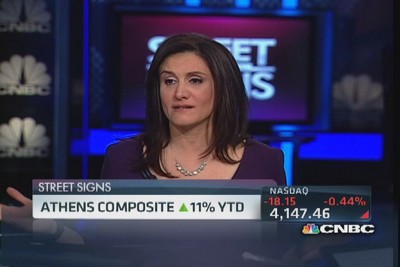Greece faces stalemate on deal on secret Swiss accounts
By: Nefeli Agkyridou, associate producer, CNBC
Switzerland agreed to share information
on Greek accounts held in Swiss banks on Tuesday, but declined to
compensate Greece for tax income lost in the past from undisclosed
accounts.
The two countries remained divided on how to solve the problem of untaxed Greek money held in secret Swiss accounts, even after Tuesday's meeting between Swiss Finance Minister Eveline Widmer-Schlumpf and her Greek counterpart Yannis Stournaras in Athens.
(Read more: Greece's third aid program may be on its way)
The two countries remained divided on how to solve the problem of untaxed Greek money held in secret Swiss accounts, even after Tuesday's meeting between Swiss Finance Minister Eveline Widmer-Schlumpf and her Greek counterpart Yannis Stournaras in Athens.
(Read more: Greece's third aid program may be on its way)
Greece wants to levy taxes on Greeks'
holdings in Swiss banks, and wants the Swiss government to pay a deposit
towards these taxes. The Greek government also wants Switzerland to pay
a deposit towards taxes Greece did not receive in the past.
Widmer-Schlumpf said Greece's request to receive taxes for past funds was outdated – despite Switzerland having struck an arrangement to that effect with the U.K.
"We should be moving towards a different direction," Widmer-Schlumpf said. However, Stournaras insisted: "We would like to have a similar model to the British one."
(Read more: Greece's bailout exit is on track: PM)
Negotiations between Greece and Switzerland have been ongoing since September 2012, as Greece attempts to clamp down on endemic tax evasion and Switzerland tries to shake off its reputation as a tax haven.
"The main axes of what the Greek government is asking for is a down-payment on future taxes, on the interest that will be applied on Greek savings in Swiss banks, and a retroactive payment for taxes the Greek government didn't receive in the past," Greek Finance Ministry sources told CNBC prior to the latest meeting.
The deal proposed by the Greek government would see its tax revenue from Swiss bank accounts rise by four-to-six billion euros ($5.4-$8.1 billion), according to reports in the Greek media.
Widmer-Schlumpf said Greece's request to receive taxes for past funds was outdated – despite Switzerland having struck an arrangement to that effect with the U.K.
"We should be moving towards a different direction," Widmer-Schlumpf said. However, Stournaras insisted: "We would like to have a similar model to the British one."
(Read more: Greece's bailout exit is on track: PM)
Negotiations between Greece and Switzerland have been ongoing since September 2012, as Greece attempts to clamp down on endemic tax evasion and Switzerland tries to shake off its reputation as a tax haven.
"The main axes of what the Greek government is asking for is a down-payment on future taxes, on the interest that will be applied on Greek savings in Swiss banks, and a retroactive payment for taxes the Greek government didn't receive in the past," Greek Finance Ministry sources told CNBC prior to the latest meeting.
The deal proposed by the Greek government would see its tax revenue from Swiss bank accounts rise by four-to-six billion euros ($5.4-$8.1 billion), according to reports in the Greek media.
Greece struggling with tax clampdown
Despite tightening tax collection since its first bailout in 2010,Greece is still struggling to clamp down on tax evasion, both international and domestic.
"As long as tax laws are constantly changing and the respective practice is all but certain, it will be very difficult to repatriate funds," said Anna-Maria Widrig Giallouraki, a senior manager at PwC in Zurich, Switzerland.
(Read more: Why hedge funds are wary of Greece)
In 2010, a list of more than 2,000 Greeks with bank accounts in HSBC's Swiss branch was handed over to the Greek authorities by Christine Lagarde, then a French cabinet minister. Coined the "Lagarde list", it triggered a public outcry when it was published by Greek media in 2012.
Last year, Greece indicted the first recipient of the list, former Greek Finance Minister George Papakonstantinou, of hiding evidence and deleting two names of his relatives. He is due to go on trial.


No comments:
Post a Comment